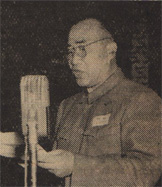
Date: May 23, 1951
Source: People's China June 16, 1951; Issue 12, Vol. III
Online Version: Zhu De Internet Archive, September 2008
Transcribed/HTML Markup: Mike B.
 |
| Vice-Chairman Chu Teh |
The Agreement between the Central People's Government and the Local Government of Tibet on the measures for the peaceful liberation of Tibet has been signed today.
This Agreement conforms with the interests of the Tibetan nationality and people, hence it also conforms with the interests of the peoples of all nationalities in China. We should warmly congratulate the people throughout the country as well as the Tibetan people.
The Tibetan nationality is one of the nationalities within the Chinese boundaries with a long history. It has performed its glorious duty in the work of creating and developing our great Motherland. But during the recent century, imperialist forces penetrated into China and also into Tibet, carrying out provocations and sowing discord.
At the same time, the reactionary regimes of China, from the Manchu Government to the Kuomintang government, submitted to the aggressive imperialist forces on the one hand, and carried out a policy of oppression and sowing dissension among the Tibetan nationality on the other. Moreover, the Local Government of Tibet did not oppose imperialist aggression and provocation but, instead, was misled and affected by them. So the Tibetan nationality and people fell into the depths of enslavement and suffering.
But, the Tibetan people love their Motherland and oppose imperialist aggression. When the nationwide victory of the Chinese People's Liberation War was in the main attained, the Kuomintang government overthrown, and the aggressive imperialist forces driven from the mainland of China, the relationships between the nationalities within the Chinese borders underwent a fundamental change. On the very day of the founding of the People's Republic of China, the Central People's Government announced the permanent abolition of the policy of national oppression, replaced it with the policy of national equality, friendship, unity and mutual assistance among the various nationalities in the country, and put this policy into effect.
As a result, most of the nationalities in the country including the Tibetans in Chinghai, Szechuan and Sikang areas secured emancipation and freedom, and have achieved or are achieving national regional autonomy. The Tibetan area has also been deeply affected. First, Panchen Ngoerhtehni declared his support for the Central People's Government one year ago. Then the People's Liberation Army entered the areas around Changtu where they were welcomed and supported by the broad masses of the Tibetan people. In these circumstances, the Dalai Lama assumed temporal power and began to correct the former erroneous policy of the Local Government of Tibet. Accepting the notification of the Central People's Government, he sent a delegation with full powers headed by Kaloon Ngabou Ngawang Jigme to the Central People's Government to conduct negotiations on measures for the peaceful liberation of Tibet. After one month of friendly contact and negotiations, the delegates with full powers of the Central People's Government and the delegates with full powers of the Local Government of Tibet have reached an agreement on the measures for the peaceful liberation of Tibet.
This is a victory of the great unity of the Chinese nation, while at the same time it is a severe defeat for the aggressive imperialist influences which attempt to obstruct and undermine the peaceful liberation of Tibet. The aggressive imperialist forces will not, however, take their defeat lying down. They may continue to engage in new obstructive and disruptive activities. The people of the country, especially the Tibetan people, should pay close attention to these and in particular, the Local Government of Tibet should be very vigilant against these. But no matter what kinds of plots and intrigues imperialism may hatch, they are doomed to thorough defeat before the mighty force of the Chinese people, which includes the Tibetan people.
The Central People's Government will certainly help the Tibetan people in wiping out the influence of imperialism in Tibet; it will achieve the unification of the territory and sovereignty of the People's Republic of China, and defend the national frontiers of our great Motherland, so that the Tibetan nationality and people will achieve liberation, return forever to the family of our great Motherland and, helped by the Central People's Government and the Han nationality, develop its own political, economic, cultural and educational work and improve and raise its standards of living step by step.
It is hoped that the Local Government of Tibet will carry out the Agreement on the measures for the peaceful liberation of Tibet in earnest, and do all it can to help the People's Liberation Army march into Tibet. It is hoped that the Dalai Lama and Panchen Ngoerhtehni will unite closely and, under the leadership of the Central People's Government, strive for the peaceful liberation of Tibet.